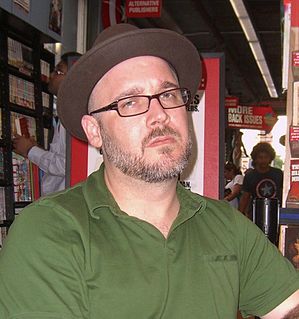Top 9 Quotes & Sayings by Ed Brubaker
Explore popular quotes and sayings by an American writer Ed Brubaker.
Last updated on April 15, 2025.
There's a reason why every successful person in Hollywood has like seven or eight projects up in the air at any point. It's like a 90 percent chance for each project that it'll never happen. Every project has about a 10 percent chance of getting made, unless you're like a Quentin Tarantino or somebody who just gets whatever they want to get done. But those are the rare cases.
With comics, you can only really learn what you're doing wrong or what works best when you see your work published. I've been publishing comics since my 20s, and still, when I flip through any of my new comics, I still only see the things that I wish I'd done better. But that's how you learn, by seeing it.
I vividly remember being in my mid- to late-20s. That part of life is very emotional, and exciting, and dramatic in a way that your late 40s are not. That's different and dramatic in other ways, but I wanted to tap into that angry youth vibe in Kill Or Be Killed that I remember feeling at that time, instead of my angry middle-aged vibe that I've been churning out for a few years.
It's a lot easier to make a living as a writer in Hollywood than it was probably 10 years ago, though there's still just as many unemployed people in Hollywood as there ever has been, but there's so many more avenues to sell things, because of digital, and Amazon, and Netflix, and all these different platforms. That's crazy and exciting in a creative way, and we'll see where that all stands five years from now. But on the corporate side, I still see that pendulum swinging back in that other direction, which is a little not comforting.
The political vibe of late-'40s Hollywood through the mid-'50s is something we're seeing a lot of echoes of right now, and in a scary way, where I'm wishing for an Edward R. Murrow to stand up and start somehow calling people on stuff. But as far as the way the industry works, I feel like we're in a place where you see companies slowly moving back to only doing their own stuff.
The good part of what comics trains you to do is it trains you - especially if you've worked in mainstream comics like Marvel and DC, or if you're just doing your own independent comics - to compartmentalize things and work on multiple things at the same time. And that's a skill that is incredibly handy in Hollywood, because within the first year that you get here, you realize there's a reason why every successful person in Hollywood has like seven or eight projects up in the air at any point.
I had done a couple TV pilots, and a friend of mine wanted to leave comics and come work in Hollywood, and I said, "Well, you've got to understand that when you sell a TV pilot, imagine if you turned in the best issue of Batman ever, and DC was like, 'Well we love this, but we can't publish it because we have to publish this other thing by this other person." The odds are really long on getting anything made, so if you come from comics and you're still making a living in comics, that really helps because you're not desperate for someone's permission to write for a living.






















